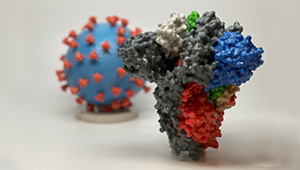COVID-19 vaccines and serious reactions: 3 questions answered

KPWHRI Biostatistics Director Jen Nelson, PhD, talks about monitoring reactions to the mRNA vaccines
The development of COVID-19 vaccines happened quickly, but with the highest priority on minimizing health risks. The ongoing monitoring of vaccines against COVID-19 is a critical part of this priority. A recent study in the Journal of the American Medical Association offers an update on the COVID-19 mRNA vaccines and adverse events that supports earlier reports on their safety.
Jennifer Nelson, PhD, Kaiser Permanente Washington Health Research Institute director of biostatistics, was a coauthor on the study, which was led by Nicola Klein, MD, PhD, of the Kaiser Permanente Vaccine Study Center in Oakland, California. Dr. Nelson answered questions about the study, the safety of mRNA vaccines against COVID-19, and next steps in monitoring the vaccines.
What’s the main takeaway from the study?
People who get an mRNA vaccine against COVID-19 show no increased risk for a wide range of rare reactions that can sometimes occur after vaccination. We're continuing to monitor, but so far, risks of serious reactions following mRNA vaccines are not concerning.
Our study analyzed data from across the country — including from Kaiser Permanente Washington — looking for serious reactions to the mRNA COVID-19 vaccines. We had data on about 11.8 million doses of either the Pfizer-BioNTech or the Moderna vaccine given to 6.2 million people in December 2020 to June 2021. We needed that much information because severe reactions to immunization, in general, are very rare.
Because serious conditions from vaccines usually appear within a few days or weeks, we compared the appearance of these conditions in people who were within 21 days of vaccination to the appearance in people who were 22 to 42 days from immunization — at that point, serious reactions from a vaccination are much less likely. We found no significant link between getting an mRNA COVID-19 vaccine and having a serious event in the expected timeframe if vaccination was involved.
The study looked at 23 conditions such as heart attacks and other cardiovascular events, Guillain-Barré syndrome, and anaphylactic (severe allergic) reactions. How did the research team decide on the conditions?
Some conditions, such as Guillain-Barré syndrome and anaphylaxis, are associated with the immune system, so they're part of regular vaccine safety monitoring. Other conditions were added to the list after consulting with the CDC (Centers for Disease Control and Prevention), the U.S. FDA (Food and Drug Administration), and other groups involved in the COVID-19 vaccine development, rollout, and monitoring. For example, initial reports raised concerns about thromboembolic events (clots in blood vessels) and the non-mRNA vaccines from AstraZeneca and Janssen, so we monitored those conditions. Another example is that COVID-19 — the disease — may be linked to some cardiovascular events, so we analyzed those as well.
Our methods included statistical analysis to see if COVID-19 vaccination was associated with increases in the 23 conditions. For some conditions, we also had trained staff do medical record reviews. For example, for people prone to anaphylaxis, exposure to an allergen such as peanuts might have been the reason for the event in the medical record. So, we were as thorough as possible in including any serious events that might be linked to the mRNA vaccines and in examining the data for any signals of connection between the events and the vaccines.
What are the next steps for vaccine monitoring?
We'll continue to monitor the mRNA COVID-19 vaccines using the same analyses on data that we receive weekly from the same sources. For a few conditions, our very detailed analysis showed patterns that we'll track particularly closely. For instance, myocarditis/pericarditis (inflammation of the heart or its outer lining) showed no association with vaccination overall, but the condition more commonly occurred in males and in the 12- to 24-year age group. Anaphylaxis rates were low in our study, as in others — for example, in a study of vaccinated health care workers. However, similar to studies from the European Union and Japan, anaphylaxis was more common in females. We don't know the reasons for these patterns, but we'll continue to watch the data closely and keep health authorities informed.
In the future, as qualified people get COVID-19 boosters, we'll get data on those vaccinations. And the Pfizer-BioNTech and Moderna vaccines are just a few of the many vaccines and medical products we help to monitor as part of several national programs. We're already tracking flu vaccinations, of course, which is part of our ongoing work.
Vaccine Safety

Biostatisticians track COVID-19 vaccine safety
Dr. Jennifer Nelson explains how KP scientists are helping the CDC and FDA keep an eye out for rare adverse events.
Research

COVID-19 pandemic research at KPWHRI
Having long tracked infectious diseases and tested vaccines, KPWHRI now focuses on the novel coronavirus.


